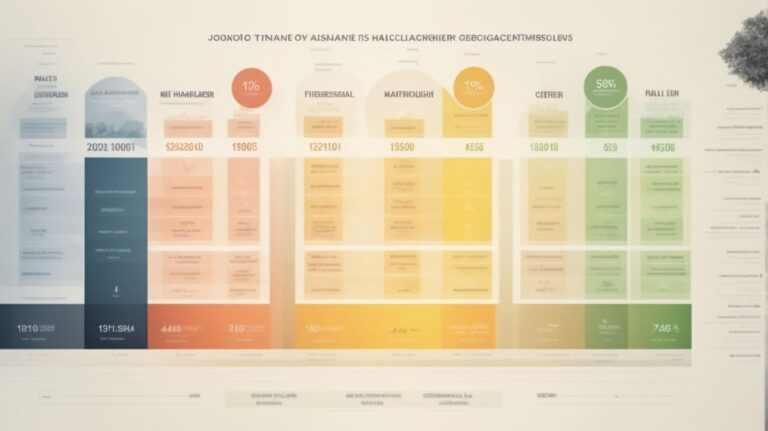Industrial psychology, also known as organizational psychology, plays a crucial role in understanding human behavior in the workplace.
From improving employee performance and satisfaction to promoting diversity and inclusion, the study of industrial psychology is essential for enhancing organizational effectiveness.
In this article, we will explore the major areas of study in industrial psychology, the skills and knowledge required, and the wide range of career opportunities available in this field.
Whether you are interested in employee recruitment, performance management, or organizational culture, industrial psychology offers a wealth of opportunities for meaningful and impactful work.
Contents
- 1 Key Takeaways:
- 2 What Is Industrial Psychology?
- 3 Why Is Studying Industrial Psychology Important?
- 4 What Are the Major Areas of Study in Industrial Psychology?
- 5 What Skills and Knowledge Are Required in Industrial Psychology?
- 6 What Are the Career Opportunities in Industrial Psychology?
- 7 Frequently Asked Questions
- 7.1 What is the significance of studying industrial psychology?
- 7.2 How does studying industrial psychology benefit organizations?
- 7.3 What skills can be gained from studying industrial psychology?
- 7.4 How does industrial psychology contribute to employee well-being?
- 7.5 What is the role of industrial psychology in talent management?
- 7.6 Can studying industrial psychology lead to diverse career opportunities?
Key Takeaways:
What Is Industrial Psychology?
Industrial psychology, also known as industrial-organizational psychology, is a specialized field of psychology that focuses on studying human behavior in the context of the workplace and organizational dynamics.
This field examines various aspects of the workforce, including employee attitudes, job performance, leadership, team dynamics, and organizational culture.
Industrial psychology aims to enhance productivity, streamline operations, and improve employee satisfaction in industrial and organizational settings. Its historical significance dates back to the early 20th century when influential figures like F.W. Taylor, E.J. Mc Cormic, Joseph Tiffin, and M.L. Blum made groundbreaking contributions to the understanding of human behavior in the workplace.
Why Is Studying Industrial Psychology Important?
Studying industrial psychology is crucial for gaining insights into human behavior in work settings, enhancing organizational efficiency, and improving employee satisfaction and performance.
Industrial psychology plays a pivotal role in understanding the dynamics of the workplace, including motivation, communication, leadership, and teamwork. By applying psychological principles, organizations can create a more conducive work environment that promotes productivity and well-being for employees.
The knowledge gained from studying industrial psychology enables companies to leverage human resources effectively, leading to better recruitment, training, and performance evaluation strategies. This field also addresses challenges such as workplace conflicts, stress management, and organizational culture, making it critical for nurturing a thriving and harmonious work environment.
Understanding Human Behavior in the Workplace
Understanding human behavior in the workplace is a fundamental aspect of industrial psychology, as it involves analyzing the dynamics of interactions, attitudes, and satisfaction among employees within an organizational context.
By comprehending the intricacies of human behavior at work, organizations can effectively address issues related to motivation, communication, and conflict resolution.
It plays a crucial role in fostering a positive work environment, boosting employee morale, and enhancing productivity. Understanding human behavior also aids in building cohesive teams, identifying leadership potential, and implementing appropriate employee development strategies.
Improving Employee Performance and Satisfaction
Improving employee performance and satisfaction is a key focus of industrial psychology, aiming to enhance productivity, job satisfaction, and overall well-being within the workplace.
One effective strategy involves implementing training programs tailored to individual employee needs and organizational goals. These programs can include skills development, leadership training, and interpersonal communication workshops, all designed to enhance employees’ competencies and confidence in their roles.
Modifying job design to align with employees’ strengths and interests can significantly boost their engagement and performance. Moreover, motivation techniques such as recognition programs, incentives, and feedback mechanisms play a crucial role in fostering a positive work environment and driving continuous improvement.
Enhancing Organizational Effectiveness
Enhancing organizational effectiveness through the application of industrial psychology principles involves optimizing processes, addressing challenges, and aligning human resources with business needs for improved productivity and sustainability.
Industrial psychology offers valuable insights into human behavior and interaction within the workplace. By applying psychological theories and practices, organizations can enhance employee satisfaction, motivation, and engagement, ultimately leading to improved performance and retention rates.
Understanding the psychological aspects of leadership, communication, and decision-making can facilitate better management and conflict resolution, creating a positive and productive work environment.
Promoting Diversity and Inclusion
Promoting diversity and inclusion in the workplace forms a crucial aspect of industrial psychology, aiming to create an environment that values varied perspectives, fosters innovation, and ensures equitable opportunities for all individuals.
Diverse teams bring together individuals with unique experiences, skills, and insights, leading to enhanced problem-solving and creativity.
To achieve this, organizations implement inclusion practices such as mentorship programs, diversity training, and affinity groups.
Strategies for creating a supportive work environment encompass establishing clear diversity goals, implementing unbiased recruitment processes, and fostering open communication channels.
Embracing diversity and inclusion contributes to improved decision-making, heightened employee morale, and a more positive organizational culture.
What Are the Major Areas of Study in Industrial Psychology?
The major areas of study in industrial psychology encompass employee recruitment, selection, training, development, performance management, workplace motivation, engagement, organizational culture, and change management, addressing various aspects of human behavior and organizational dynamics.
Employee recruitment involves the development of effective recruitment strategies, job analysis, and candidate assessment methods to ensure the selection of suitable employees. Selection processes often utilize psychological tests, interviews, and assessment centers to identify the most qualified candidates.
Training and development aim to enhance employee skills and knowledge through various methods such as coaching, mentoring, and e-learning programs. Performance management includes goal setting, feedback mechanisms, and performance appraisals to optimize employee productivity.
- Workplace motivation explores the factors that drive employee performance and commitment, including incentive systems, job design, and psychological give the power toment.
- Employee engagement examines the emotional connection and commitment of employees to their work and the organization, with an emphasis on factors contributing to high engagement levels.
Organizational culture studies the shared values, beliefs, and norms within an organization, impacting employee behavior, work attitudes, and organizational effectiveness. Change management addresses the psychological aspects of organizational change, including resistance, adaptation, and employee well-being during transitions.
Employee Recruitment and Selection
Employee recruitment and selection processes are critical components of industrial psychology, involving the identification and placement of individuals with the right skills, attitudes, and fit for specific job roles within organizations.
Job analysis serves as the foundation for effective recruitment by carefully examining the duties, responsibilities, and qualifications required for each position. This enables organizations to craft accurate job descriptions and person specifications, which play a crucial role in attracting suitable candidates.
Utilizing various interviewing methods such as structured interviews, behavioral interviews, and situational interviews ensures a comprehensive evaluation of candidates’ competencies and cultural fit. Talent acquisition involves utilizing modern techniques like social media recruitment, employer branding, and recruitment marketing to attract top talent and enhance the organization’s employer reputation.
Training and Development
Training and development initiatives in industrial psychology focus on enhancing individuals’ skills, knowledge, and attitudes to meet the evolving demands of the work environment and provide specialized training for career advancement.
This is achieved through various approaches such as on-the-job training, which allows employees to learn while performing their actual tasks, gaining practical experience and skills.
Specialized programs encompass targeted courses or workshops designed to enhance specific competencies required for particular roles or industries.
Organizations implement career development strategies, enabling employees to pursue growth opportunities through mentorship programs, leadership training, and skill-building activities tailored to their professional aspirations.
Performance Management
Performance management in industrial psychology involves assessing, motivating, and enhancing individuals’ performance to align with organizational goals, addressing factors such as job satisfaction, attitudes, and productivity.
One of the key elements of performance management is the performance appraisal process, which entails a systematic evaluation of an employee’s performance, typically conducted annually or semi-annually.
It allows managers to provide constructive feedback, set goals for improvement, and identify training and development needs. Effective feedback mechanisms play a crucial role in this process, enabling ongoing discussions between employees and managers to address strengths, areas for improvement, and career aspirations.
Workplace Motivation and Engagement
Workplace motivation and engagement are critical aspects of industrial psychology, aiming to foster a positive work environment, enhance job satisfaction, and promote active involvement in organizational goals and activities.
Factors influencing workplace motivation and engagement are multifaceted, including intrinsic and extrinsic motivators.
Intrinsic motivators stem from an individual’s internal desires and values, such as a sense of accomplishment and personal growth. Extrinsic motivators, on the other hand, involve external factors like monetary rewards and recognition.
Implementing effective employee engagement strategies can significantly contribute to a motivated and engaged workforce. This may involve fostering open communication channels, providing opportunities for skill development, and recognizing and rewarding employees’ contributions.
The impact of workplace motivation and engagement extends beyond individual well-being, influencing organizational outcomes such as productivity, employee retention, and overall performance.
Organizational Culture and Change
Organizational culture and change management form integral components of industrial psychology, addressing the values, norms, and adaptability of organizational structures, and leadership, to facilitate sustainable change and growth.
Organizational culture is influenced by behavioral patterns, communication styles, and decision-making processes. These factors play a significant role in shaping the collective identity and fostering a sense of belonging among employees. To successfully implement change, effective change management strategies involve careful planning, proactive engagement, and clear communication to mitigate resistance. As a guiding force, leadership holds the responsibility of articulating a compelling vision, creating a supportive environment, and modeling the desired cultural traits to align the organization towards its strategic objectives.
What Skills and Knowledge Are Required in Industrial Psychology?
The field of industrial psychology demands a diverse skill set and knowledge base, including an understanding of human behavior, analytical and research skills, effective communication, and a solid grasp of business and organizational dynamics.
This multifaceted discipline requires proficiency in various research methodologies such as experimental design, surveys, and qualitative analysis. Expertise in data analysis and interpretation is crucial in identifying patterns and trends within organizational behavior.
Effective communication strategies are essential for conveying findings and recommendations to stakeholders, including written reports and presentations. A deep understanding of business acumen is imperative to contextualize findings within the framework of organizational goals and strategic decision-making.
Understanding of Human Behavior and Psychology
A comprehensive understanding of human behavior and psychology is essential for industrial-organizational psychologists, enabling them to analyze, interpret, and address workplace dynamics and individual differences effectively.
Industrial-organizational psychologists gain valuable insights into employee motivation, group dynamics, and leadership styles by diving into the complexities of human behavior. Psychological principles provide a framework for understanding the cognitive and emotional factors that impact decision-making, communication, and job satisfaction within a diverse workforce.
With a deep comprehension of human behavior, psychologists can develop and implement strategies for talent management, organizational development, and employee well-being. This fosters a more productive and harmonious work environment.
Analytical and Research Skills
Possessing strong analytical and research skills is crucial for industrial psychologists to identify workplace problems, analyze workforce dynamics, and fulfill their role in addressing organizational challenges effectively.
Analytical skills enable industrial psychologists to critically evaluate complex data regarding job performance, employee attitudes, and organizational structures. They can utilize various research methodologies such as qualitative and quantitative analysis to gather insights into employee behavior and organizational dynamics.
These skills are paramount in problem-solving approaches as they enable psychologists to develop and implement interventions that improve job satisfaction, productivity, and organizational effectiveness.
Communication and Interpersonal Skills
Effective communication and interpersonal skills are vital for industrial psychologists, enabling them to engage with people, facilitate training programs, and navigate complex organizational dynamics and career pathways.
These professionals must be adept at articulating concepts in a clear and concise manner, whether conducting employee assessments, delivering feedback, or designing interventions.
Understanding nonverbal cues and effectively utilizing active listening are crucial for establishing rapport and trust with clients and colleagues.
Collaboration with diverse teams and the ability to resolve conflicts diplomatically are pivotal in promoting a positive work culture and enhancing productivity.
Business and Organizational Knowledge
A solid understanding of business and organizational dynamics is essential for industrial psychologists, enabling them to apply psychological principles to address the needs and challenges within a business or company setting.
Industrial psychologists possess a deep understanding of business and organizational dynamics, which enables them to create customized interventions that enhance employee well-being, performance, and job satisfaction. With this knowledge, they can develop evidence-based strategies for recruitment, selection, training, and development that align with the organization’s goals. They are also equipped to lead change management efforts, resolve workplace conflicts, and cultivate a culture of growth and innovation within the business environment.
What Are the Career Opportunities in Industrial Psychology?
The field of industrial psychology offers diverse career opportunities, including roles in human resources, training, organizational development, and consultancy, with the potential for specialized training, competitive salaries, and varied job tasks.
Industrial psychologists may find careers in various industry sectors such as manufacturing, healthcare, finance, and technology. They apply their expertise in areas like employee assessment, performance management, and workplace diversity.
There is a growing demand for industrial psychologists in research institutions, government agencies, and academic settings. Here, they can contribute to the development of evidence-based practices and policies to improve workplace environments.
Professional growth in this field can involve obtaining advanced degrees, certifications, and gaining experience in specialized areas. These may include occupational health psychology, work-life balance initiatives, or employee well-being programs.
Frequently Asked Questions
What is the significance of studying industrial psychology?
Studying industrial psychology helps individuals understand the behaviors and interactions within the workplace, leading to improved job performance and overall organizational success.
How does studying industrial psychology benefit organizations?
Industrial psychology provides valuable insights into employee motivation, job satisfaction, and organizational culture, which can help organizations create a positive and productive work environment.
What skills can be gained from studying industrial psychology?
Studying industrial psychology can develop skills in data analysis, research methods, critical thinking, and problem-solving, all of which are highly valued in the workplace.
How does industrial psychology contribute to employee well-being?
Industrial psychology focuses on creating healthy and supportive work environments, which can enhance employee well-being and reduce workplace stress.
What is the role of industrial psychology in talent management?
Industrial psychology plays a crucial role in identifying and developing talent within organizations, leading to more effective hiring, training, and career development practices.
Can studying industrial psychology lead to diverse career opportunities?
Yes, studying industrial psychology can lead to a variety of career opportunities, including human resources, organizational development, and management consulting, among others.




